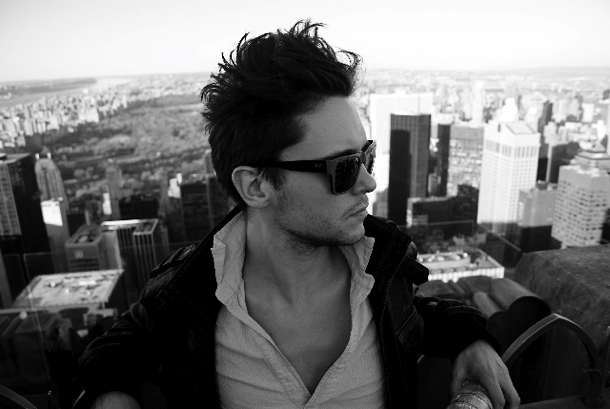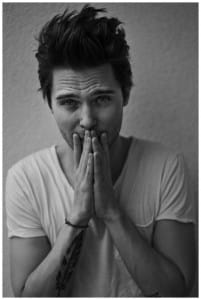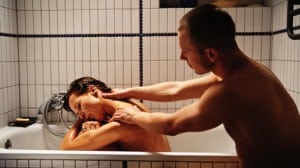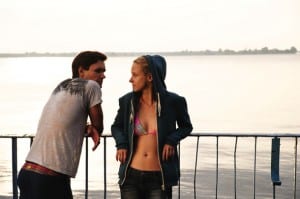
 As the opening credits of Floating Skyscrapers begin to unfold, the sound of water seeps onto the soundtrack, placing us audibly within the enclosed world of an indoor swimming pool. But embedded within the sounds of the waves, another noise becomes discernible: someone is, it would seem, undergoing an act of sexual pleasure. The credits make way, and the sounds continue over a symmetrical widescreen image of the swimming pools’ changing room doors, all closed. Whatever is happening, whatever we are hearing, is taking place inside these doors. But this is not for us to see. Instead, we go to our protagonist, Kuba, as he jogs along, the camera following in a fit of motion. Later, he will go to a party with his girlfriend Sylwia, and there he will meet a young man, Michal, with whom he will develop a love affair. It’s a striking set up for what has been dubbed Poland’s first LGBT film.
As the opening credits of Floating Skyscrapers begin to unfold, the sound of water seeps onto the soundtrack, placing us audibly within the enclosed world of an indoor swimming pool. But embedded within the sounds of the waves, another noise becomes discernible: someone is, it would seem, undergoing an act of sexual pleasure. The credits make way, and the sounds continue over a symmetrical widescreen image of the swimming pools’ changing room doors, all closed. Whatever is happening, whatever we are hearing, is taking place inside these doors. But this is not for us to see. Instead, we go to our protagonist, Kuba, as he jogs along, the camera following in a fit of motion. Later, he will go to a party with his girlfriend Sylwia, and there he will meet a young man, Michal, with whom he will develop a love affair. It’s a striking set up for what has been dubbed Poland’s first LGBT film.
Prior to the film’s release, Alex Barrett spoke to director Tomasz Wasilewski.
Could you please describe Floating Skyscrapers in your own words?
It’s a film about love, about finding one’s place in modern reality, about looking for one’s own self and fighting for it, which is never easy.
Can you say something about how the idea for the film originated? 
The first stimulus to write the story was a bus station in Warsaw. This place interested me and inspired [me] greatly as a filmmaker, and this is why most of the story took place there. Initially, it was a story about a fifty-year-old woman who worked at the station. The plot focused on her relationship with her daughter and the relationship between the daughter and another girl. I worked on the script for a long time and so it changed a lot. Each new version brought new characters and new solutions and finally, Floating Skyscrapers became a film about a guy, a swimmer who falls in love with another man.
The characters in the film come across as being very nuanced. How much of this was written into the script, and how much came from the performances?
It was already written into the script. This is how I construct my characters. Of course, a script is just a story on paper and actors are necessary to make it real. On the set I lead them in such a way that, so to speak, they play it inwards. I like it when actors are very emotional but hide their emotions and feelings all the time. They’re torn apart by them. Thanks to this, they are dramatic characters and such characters interest me most in the cinema. Playing with nuances, this is it!
Could you talk a little more about your approach to working with the actors, and how you direct them?
Rehearsals for the movie lasted five months. It was very important to me that the actors understand their characters very thoroughly. I wanted them to know their soul and their emotions. For me, human truth is most important in a movie, the truth of the character. When it’s present, the viewer can identify with the characters even when they’re very different to him. I always ask actors not to play their characters but to become them.
The relationship between Kuba and Sylwia is very messy, and I don’t think we see that kind of reality in cinema very often. Were you deliberately trying to show something not seen in other films, or just doing what felt right for the story?
I always search for truth in movies. This is what’s most important to me. I never reflect on making a film in a specific way that is supposed to elicit a specific reaction. You can’t make auteur films like this. Characters are made of their emotions, of what they feel inside. This is what directs them and it is this internal state of being broken that is responsible for their decisions. There are no easy and simple situations in life, so there shouldn’t be any in a film either. All in all, a film is life.
During the first ten minutes of Floating Skyscrapers, Michal talks about films and Kuba watches one. Was Floating Skyscrapers intended as a comment on cinema in any way?
When Kuba and Michał meet for the first time, Michał is talking about The Kid with a Bike, a film by the Dardenne brothers. Personally, I love this movie. When I was constructing this scene, I had just watched it. Of course, the film made a huge impression on me. I like films by the Dardenne brothers in general. It’s my way of paying tribute to them.
Who else were you influenced by when making the film?
I love the movies of Urlich Seidl, Michael Haneke, Darren Aronofsky and Steve McQueen. There are many directors whose work I respect – Sophia Coppola, David Fincher, Andrey Zvyagintsev. I watch a lot of movies and often go to the theatre, but I can’t determine how much the works of others influence my own works. I think there aren’t any direct inspirations. I make films my own way, intuitively.
There’s a lot of motion in the film: driving, running, swimming. It seems almost like the characters want to escape – and yet they never really do. Could you talk about what these passages of motion symbolised for you?
This is exactly what it’s like with us – people. Very often we find ourselves in situations from which we want to escape but we don’t do this. A film needs to be as close to life as possible and characters in it similar to real people. Internally, we’re very complex, often broken and full of contradictions. And it’s the same in the case of the characters in Floating Skyscrapers. Does this carry any symbolic meaning? I don’t know, I haven’t thought about it. I work intuitively. I assume that if something moves me it will also move the viewers. I’m fascinated by characters who are lost, internally broken, who’ve reached a turning point in life. For me as a filmmaker, they’re most important, and such characters are full of contradictions. On the one hand, they want to escape and on the other, stay. Isn’t this what’s most beautiful in human nature?
 The film is beautifully shot. Can you talk about how you construct your images?
The film is beautifully shot. Can you talk about how you construct your images?
I worked on it together with the cameraman, Kuba Kijowski. I asked him to use as many master shots and flat frame shots and as much fluorescent light as possible. These are the things I like in the film language. Besides, I chose places that were mostly built of concrete. During colour grading, Kuba was looking for an appropriate colour for the film and he decided that everything should be in silver. I think it was a brilliant idea. In addition to this, many images are in the colour of water, which is the natural environment for the protagonist. I attach a lot of weight to images in a film. They can’t be random and neither can be the places in which they’re shot.
Floating Skyscrapers has been called the first Polish LGBT film. Why do you think it has taken this long for it to happen, and why now? What’s changed?
It was difficult, even very difficult, to find money for the film. The producers found a great number of private persons who started functioning as co-producers. It changed slightly after the world premiere at Tribeca IFF in NYC and also when we won East of the West Competition in Karlovy Vary International Film Festival – then we found additional funding. In Floating Skyscrapers, the way in which the homosexual character is portrayed is new. Until now this was quite foreign to the Polish or even post-communist countries cinematography. Homosexual characters were usually in the background and depicted in a mocking way. Floating Skyscrapers portrays [the character] Kuba most of all as a human being; ok, he’s homosexual but it’s not what’s most important about him. Kuba is a son and a swimmer, he has his own dreams and he’s got a girlfriend. His homosexuality is not the most important thing, although it pushes him towards some decisions and sometimes determines his life.
FLOATING SKYSCRAPERS IS ON GENERAL RELEASE FROM 6TH DECEMBER 2013 NATIONWIDE